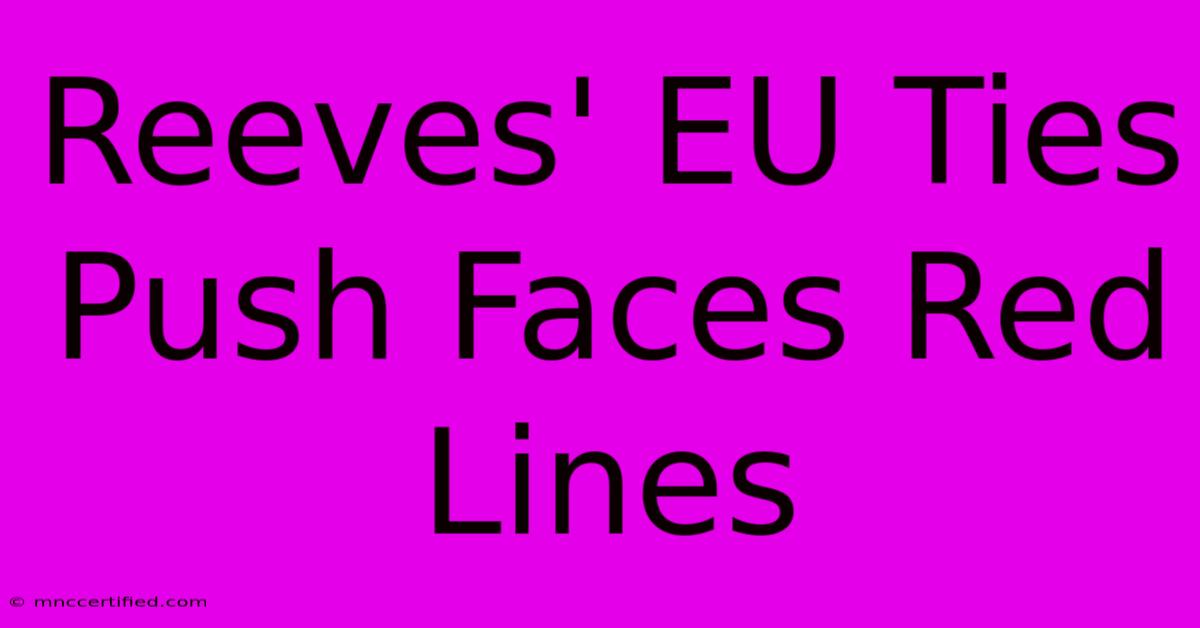Reeves' EU Ties Push Faces Red Lines

Table of Contents
Reeves' EU Ties Push Faces Red Lines
The UK's Deputy Prime Minister, Oliver Dowden, recently stated that the government's efforts to strengthen ties with the European Union are facing significant obstacles. While the government aims for closer collaboration in various areas, certain "red lines" remain, preventing a full rapprochement. This article delves into the complexities of the UK's post-Brexit relationship with the EU, examining the key areas of friction and the political implications of Reeves' push for closer ties.
Understanding the "Red Lines"
The term "red lines" refers to non-negotiable limits set by the UK government in its dealings with the EU. These are areas where the government is unwilling to compromise, even if it means hindering closer collaboration. Key red lines include:
1. Sovereignty:
This is arguably the most important red line. The UK government insists on maintaining full control over its laws, borders, and national interests. Any agreement that infringes upon this sovereignty is likely to be rejected. The Northern Ireland Protocol, for example, highlights the complexities of balancing closer ties with safeguarding sovereignty. Maintaining legislative independence is paramount for the UK.
2. The Single Market and Customs Union:
Rejoining the EU's single market or customs union is completely off the table. The government maintains that leaving these structures was crucial for regaining control over trade policy and borders. Proposals for closer economic ties must respect this fundamental position. Any suggestion of a return to these arrangements is likely to be met with strong resistance.
3. The European Court of Justice (ECJ):
The UK's departure from the EU also meant leaving the jurisdiction of the ECJ. Accepting the ECJ's authority would be a major concession, contradicting the government's commitment to independent legal jurisdiction. This is a firm red line that is unlikely to be crossed.
Reeves' Push for Closer Ties: A Balancing Act
Despite these red lines, there is a clear desire within the government, spearheaded by figures like Reeves, to improve the UK's relationship with the EU. This involves focusing on areas where collaboration can benefit both sides without compromising core principles. This nuanced approach aims for pragmatic cooperation while adhering to the established red lines.
Areas of Potential Cooperation:
- Security: Collaboration on issues such as counter-terrorism and crime is a priority. This area offers the potential for increased cooperation without requiring concessions on sovereignty or economic integration.
- Trade: While full reintegration into the single market is not on the cards, there's scope for streamlining trade processes and reducing friction. This requires a pragmatic approach to trade negotiations without compromising on the UK's independent trade policy.
- Research and Development: Joint ventures in scientific research and development can benefit both the UK and the EU. This area requires less political sensitivity compared to trade or security issues.
The Political Landscape and Public Opinion
The government's approach to EU relations is a delicate balancing act. It must navigate competing interests within its own party and manage public opinion. There's a segment of the population that favors a closer relationship with the EU, while others remain staunchly pro-Brexit. The government needs to demonstrate that its approach is both pragmatic and respects the democratic mandate of leaving the EU.
Conclusion: Navigating a Complex Relationship
The UK's relationship with the EU remains complex and fraught with challenges. While there's a desire to improve ties, the government’s red lines significantly restrict the scope for closer collaboration. Reeves' push for closer ties requires a careful balancing act, focusing on areas of mutual benefit while respecting the UK's sovereign interests. The success of this approach will depend on pragmatic negotiations and skillful political management. The long-term outcome remains uncertain, highlighting the ongoing complexities of the post-Brexit era.
Keywords: Reeves, EU, Brexit, red lines, sovereignty, single market, customs union, ECJ, trade, security, cooperation, political landscape, public opinion, post-Brexit, UK, Oliver Dowden, Northern Ireland Protocol.
Off-Page SEO Strategies:
- Link building: Secure backlinks from relevant and authoritative websites covering UK politics, international relations, and EU affairs.
- Social media promotion: Share the article across relevant social media platforms to increase visibility and reach a wider audience.
- Guest blogging: Write guest posts on other blogs in the same niche to drive traffic back to your article.
- Community engagement: Participate in online forums and discussions related to Brexit and UK-EU relations to establish your expertise and generate interest in your article.
This comprehensive approach combines on-page and off-page SEO techniques to optimize the article for search engines and enhance its visibility online. Remember to regularly monitor your article's performance and adjust your SEO strategy as needed.

Thank you for visiting our website wich cover about Reeves' EU Ties Push Faces Red Lines. We hope the information provided has been useful to you. Feel free to contact us if you have any questions or need further assistance. See you next time and dont miss to bookmark.
Featured Posts
-
Belfast Airport Closed After Incident
Dec 23, 2024
-
Titans Colts Highlights Week 16 Nfl
Dec 23, 2024
-
Match Report Spurs 3 6 Liverpool Defeat
Dec 23, 2024
-
Carolina Loss Ends Cardinals Playoff Run
Dec 23, 2024
-
10 Mariah Carey Holiday Hits
Dec 23, 2024